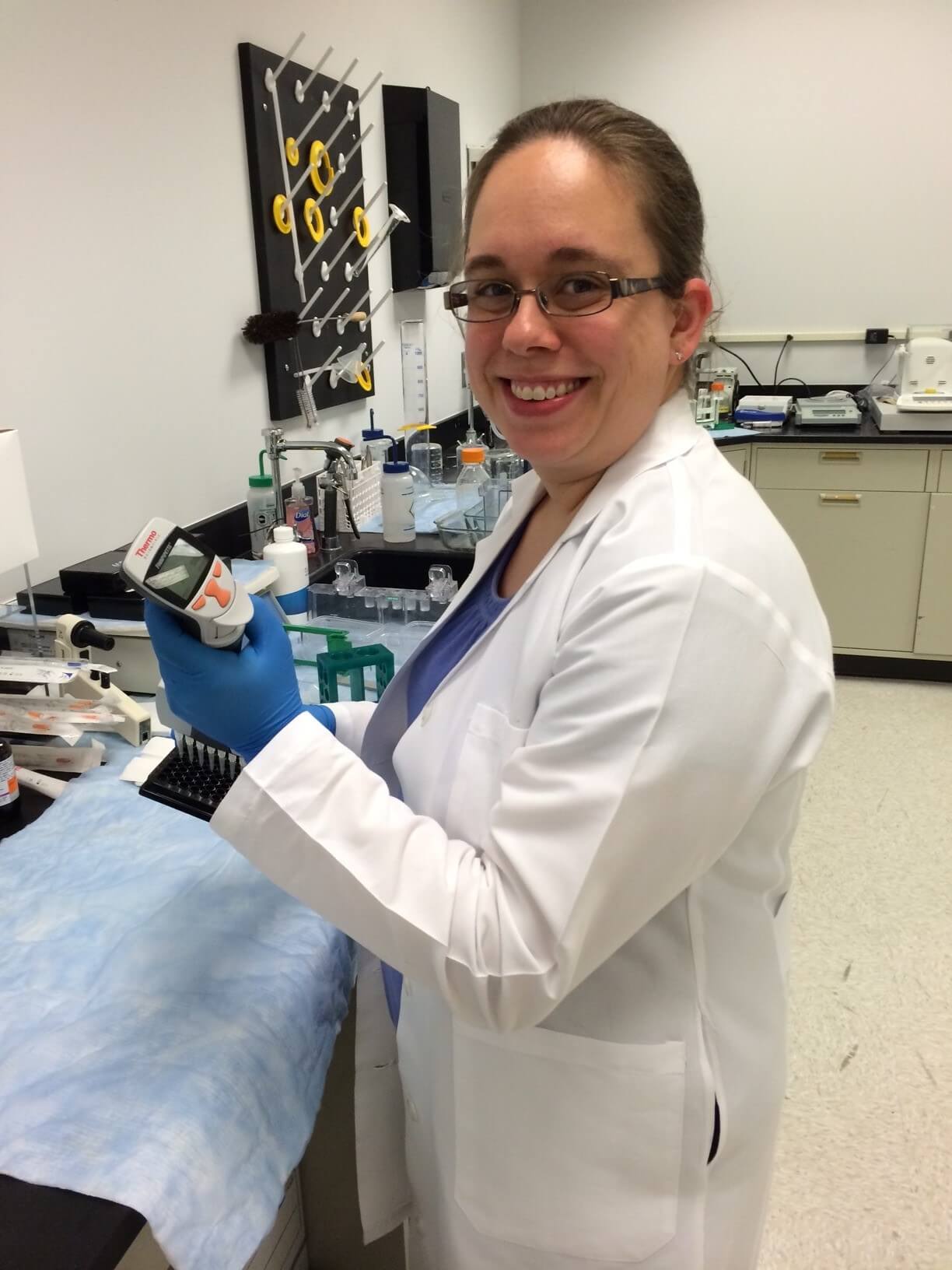
Parion's $19.6M Inflow To Help Many Breathe Easier
By Susan Poulos, NCBiotech Writer
 |
| Diane Villalon, Ph.D., came to Parion through an NCBiotech Industrial Fellowship Program grant. After the fellowship she became a permanent member of the research team. -- Parion Sciences photo |
Mucus.
Non-adolescents generally don’t think much about it until they’re suffering from allergies or a cold. For most people, you might say, ‘snot a big deal.
But a layer of protective mucus in sensitive bodily tissues plays a critical role in keeping our bodies healthy. People who have mucosal surface deficiencies suffer from conditions ranging from dry eye disease to life-threatening pulmonary diseases, including cystic fibrosis (CF), chronic obstructive pulmonary disease, and idiopathic pulmonary fibrosis.
Although these conditions affect millions of people globally, locally they are being positively impacted by Durham’s Parion Sciences (pronounced PARRY-on), a drug development company dedicated to research, development and commercialization of treatments to improve and extend the lives of patients with compromised mucosal surface defenses, primarily in the eyes and lungs.
New multi-million dollar funding expands Parion’s research
In a recent four-week period, Parion received multi-million dollar funding for its compelling work:
- A $15.6 million, five-year grant from the National Institutes of Health supports research into novel expectorants (mucolytic agents) discovered by Parion. The grants were awarded to the University of North Carolina at Chapel Hill and the University of Colorado, Denver. These agents will be tested as a way to target mucus structure and enable clearance of mucus from the lungs. Severe and chronic pulmonary disorders like CF cause adherent secretions that must be cleared from the lungs.
- A $3 million award from the Cystic Fibrosis Foundation Therapeutics (CFFT) allows additional research on Parion’s experimental product for CF — a genetic and incurable disease of the mucus glands that can lead to progressive lung failure.
Additionally, the CFFT awarded $967,000 to Parion to continue cystic fibrosis transmembrane conductance regulator (CFTR) corrector studies. Parion is currently working on developing an oral CFTR corrector.
NCBiotech’s early support set the stage for success
Parion was co-founded in 1999 by Richard Boucher, M.D., UNC at Chapel Hill's James C. Moeser Eminent Distinguished Professor of Medicine and director of the recently established Marscio Lung Institute and of UNC's Cystic Fibrosis/Pulmonary Research & Treatment Center. The other co-founder was Ross Johnson, Ph.D., a world-renowned medicinal chemist -- an expert in drug design and discovery. Bottom line: if you want to delve into mucus, you're in the right neighborhood.
Even before Parion’s creation, the North Carolina Biotechnology Center recognized the positive impact these scientists' developing treatments could have on the world. NCBiotech provided early funding to help support some of the research that is now creating jobs and potential therapies, research that helped lay the foundation for therapeutic success.
“NCBiotech’s ability to provide funding to acquire scientific talent early in Parion’s history was an extremely valuable asset,” said Parion President Paul Boucher, Richard’s son.
“For example, the (NCBioech) Industrial Fellowship Grant program enabled us to bring in an expert in the field of CFTR research. The Industrial Fellow (Diane Villalon, Ph.D.) generated valuable data that allowed us to advance the project and secure much larger funding commitments from the Cystic Fibrosis Foundation. Her accomplishments directly led to an additional $1.7 million from the CFF, and enabled Parion to hire a team of four full-time employees, including the Industrial Fellow, to continue developing the program. Without the NCBiotech funding we were unable to hire such talent so early on in the program.”
Other NCBiotech funding that has facilitated Parion’s important work includes:
- A $206,000 Institutional Development Grant in 1995 to equip Richard Boucher’s lab with a specialized microscope needed for his groundbreaking work that led to Parion’s creation.
- A $100,000 Collaborative Funding Grant (CFG) went to Parion and UNC in 2009 for the development of special cultures for the advancement of novel dry eye therapies.
Along with other federal and private funding, Parion was granted nine Small Business Innovation Research (SBIR) grants to develop five different therapies for unmet medical needs in lung, eye and mouth diseases. Boucher said the SBIR grants generated key proof-of-concept data leading to follow-on investments through several corporate partnerships – among them a license agreement with Santen, the largest ophthalmology company in Japan.
Biotech companies encouraged to explore, persist
Boucher’s advice to other biotech companies striving to survive: “It is important not only to have a novel approach or technology, but also the creativity, persistence and patience to drive your innovations through the various, and often unexpected, stage gates of development. Parion is appreciative of the all the support from NCBiotech and excited that we were able take advantage of several of these programs designed to generate key early-stage scientific results that enabled our programs to advance.”
